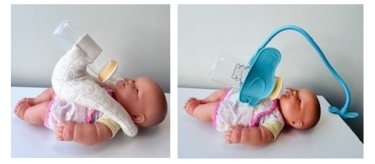The Australian Competition and Consumer Commission notes that safety warning notices warn consumers of the possible risks of injury or death to infants and children associated with the use of these products.
“The ACCC is investigating the safety of both of these products to determine if they will or may cause injury to any person, and the extent to which regulatory action is needed to prevent their supply or mitigate safety risks,” ACCC Deputy Chair Catriona Lowe said.
“Aftermarket children’s car seat head straps are marketed as a support for sleeping children, but the safety warning notice issued about these products warns about the possible risk that in motor vehicle accidents they may cause severe head, neck, and spinal cord injuries.”
“Baby bottle self-feeding devices are designed to position bottles so liquid can flow into infants’ mouths without the assistance of a caregiver, which the safety warning notice warns may increase the possible risk of suffocation, aspiration pneumonia, choking or ear infection. This is because babies are unable to regulate the flow of liquid,” Lowe said.
“While the ACCC is not aware of any reports where these products have been directly linked to injuries or deaths in Australia, alarmingly there have been reports of fatalities overseas.
“Protecting vulnerable young children and strengthening product safety online are priorities for the ACCC.”
Aftermarket children’s car seat head straps
Aftermarket children’s car seat head straps are predominantly supplied in Australia by third party sellers via online platforms and small online businesses.
The head straps come in various designs and typically feature a forehead strap that attaches to the top a of a child car seat.
Concerns have been raised with the ACCC that these products may alter the alignment of a child’s head, neck, and spine while the torso moves forward during a motor vehicle accident. This may increase the risk of possible spinal cord injuries and potential death and presents a possible risk of suffocation or strangulation should the head strap slip or drop around a child’s mouth or neck.
While the ACCC is not aware of any reports where head straps have been directly linked to injuries or fatalities in Australia, it was reported in 2021 that in the UK an 8-month-old infant died due to suffocation connected to the use of a head strap in a car accident.
Under the sAustralian Consumer Law, suppliers of child restraints are required to comply with the Mandatory Standard for child restraints for use in motor vehicles, however this only prevents the supply of accessories supplied with the child restraint by the manufacturer and does not apply to aftermarket head straps.
Baby bottle self-feeding products
Baby bottle self-feeding devices fall into twocategories – self-feeding pillows, which are often referred to as ‘anti spitting pillows’ or ‘baby feeding pillows/bottle holders’, and hands-free baby bottle holders which commonly attach to bibs, prams, or cots. Both types may cause babies to choke as they are unable to regulate the flow of liquid.
The self-feeding devices may also increase the risk of suffocation if the baby’s head moves, leading it to be smothered, and may cause ear infections if the baby is fed while on their back.
The use of baby bottle self-feeding products is not recommended according to Commonwealth, and state and territory government advice, which advises against propping up a bottle for a baby to feed and feeding a baby unsupervised.
The ACCC is aware of four fatalities associated with self-feeding products and propped products overseas. Three fatalities associated with self-feeding products were reported in the US between 2018 to 2021. There was also one fatality in the UK in 2015 when a four-month-old was left to feed unsupervised in a car seat with a bottle propped using a blanket.
There are currently no mandatory product safety or information standards that apply to these products in Australia.
Advice to consumers
Consumers who have purchased or own these products should immediately stop using them and dispose of them safely so that they cannot be used by anyone else.
Consumers should check the car seat manufacturer’s instructions before purchasing and fitting aftermarket accessories.
For self-feeding products, consumers should always follow government safe baby feeding advice to never prop up a bottle or leave an infant to feed unsupervised.
Advice to suppliers
The ACCC strongly advises suppliers of these products to conduct a risk assessment and take any action necessary to address any safety issues, which could include initiating a voluntary product safety recall and notifying the ACCC via the online form on the ACCC website.
Background
Following the ACCC’s investigation of both aftermarket children’s car seat head straps and baby bottle self-feeding devices, the ACCC will provide recommendations to the Assistant Treasurer, including on whether further action is needed to prevent supply of the products or mitigate the possible product safety risks.
Baby bottle self-feeding devices are banned in Canada and Ireland and in 2022 the UK issued Product Safety Alerts for all baby bottle-self feeding products and issued withdrawal notices to several online platforms.
The ACCC is not aware of regulatory actions taken internationally by product safety regulators concerning aftermarket children’s car seat head straps.








































